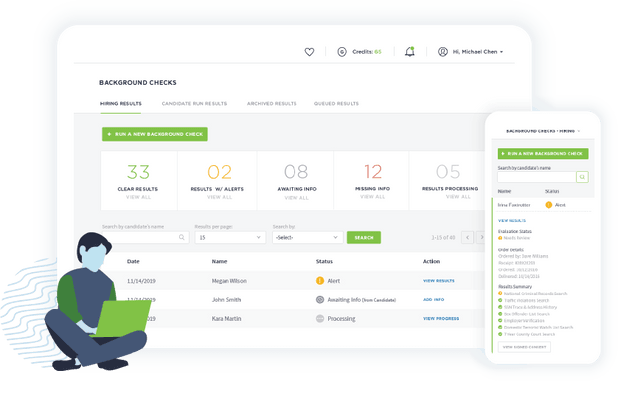How to Run Employment Background Checks: A Complete 5-Step Guide
Learn how to run a background check for employment to make informed, fair, and compliant hiring decisions
Many California employers conduct background screenings to confirm a candidate’s qualifications and experience, verify professional licenses, review criminal history, driving records, and more. To ensure your background checks are in compliance with all relevant laws, here’s what employers should know before performing a background check in California.
Pre-employment background checks can help California employers make informed hiring decisions by providing important information about a candidate’s work experience, education, criminal history, and more. Because employment background checks in California are strictly regulated, it’s essential that employers’ screening processes remain compliant with applicable federal, state, and local laws. Keep reading to learn more about California background checks.

A California background check searches public records (such as court records or motor vehicle records) and private sources (such as employer or school records) for relevant information about a job candidate or volunteer. Employers may conduct a wide range of background screenings depending on federal, state, and local laws, as well as industry regulations and the organization’s background check policy.
To get a California background check, employers can choose to search public records themselves or use a consumer reporting agency (CRA) to handle the screening process. Employers may be able to do a background check in California online, but using government databases, completing forms and mailing in requests for public records, reviewing court records, and contacting former employers can be a laborious process. Working with a qualified background check provider is generally more efficient than a DIY approach.
Using a CRA, like GoodHire, to perform background checks can streamline your background screening process and HR workflows, helping you hire faster. GoodHire has access to multiple databases allowing us to quickly search public records and complete screenings, such as national criminal record checks and sex offender registry checks, in as little as one day, while our platform has workflows to support compliance of California’s ever-evolving laws.

How far back an employment background check in California goes depends on the type of background check being conducted and whether you are working with a CRA or performing screenings on your own.
There are also several statewide laws that may impact the lookback period of criminal record checks in California. For example, the Investigative Consumer Reporting Agency Act (ICRAA) generally restricts CRAs from reporting non-conviction records (including non-pending arrests, indictments, and misdemeanor charges) or convictions that are more than seven years old.
California MVR checks may report accidents going back three years. Depending on the offense, driving-related convictions can be reported going back three or seven years. California MVRs usually report any car accidents going back three years; traffic violations may be reported from three to seven years.
Employees that partner with a CRA, like GoodHire, must comply with the federal Fair Credit Reporting Act (FCRA). Under this act, reporting of non-conviction information is limited to a seven-year lookback period. This includes most credit report information, civil judgements, and tax liens. Bankruptcies may be reported for ten years while criminal convictions may be reported indefinitely. Note, however, that California state law will impact how far back the employment background checks go and what can be reported. If you conduct searches on your own or if a candidate’s expected salary is $75,000 or higher, FCRA limitations may not apply.
There are many California background check laws that may regulate an employer’s use of criminal records, driving history, credit checks, and more. The Investigative Consumer Reporting Agency Act (ICRAA) and California Fair Chance Act (FCA) both apply statewide. In certain instances, additional laws may apply such as California Labor Code 432.7 and California Civil Code § 1785.20.5.
Several California counties and cities, like San Francisco and Los Angeles, have their own Ban the Box laws applying to background checks, which usually restrict or impact the use of criminal history in employment decisions. Many of these laws are now superseded by the recently expanded statewide Fair Chance Act.
Employers who choose to partner with a CRA must comply with the Fair Credit Reporting Act (FCRA). This federal law requires employers to provide disclosure of their intent to conduct a background check and obtain consent from the candidate before proceeding. Additionally, if an employer decides not to extend an offer of employment because of information that appeared in a pre-employment screening, they must give candidates a summary of their rights and follow the adverse action process.
Employers who are unsure which laws apply to them may wish to consult with their legal counsel to minimize risk.
Employment background checks can help California employers maintain a safe working environment and minimize organizational risk. Working with a trusted background check provider, like GoodHire, helps streamline the process. We offer 100+ screening options for California employers, allowing you to create customized background check packages for every role, at any scale. Plus, our easy-to-use platform saves you time with built-in, automated workflows that simplify compliance from start to finish. Get started today.

The resources provided here are for educational purposes only and do not constitute legal advice. We advise you to consult your own counsel if you have legal questions related to your specific practices and compliance with applicable laws.
Learn how to run a background check for employment to make informed, fair, and compliant hiring decisions
A “failed” a background check doesn’t necessarily mean you shouldn’t hire the candidate. Follow these five steps to make an informed decision.